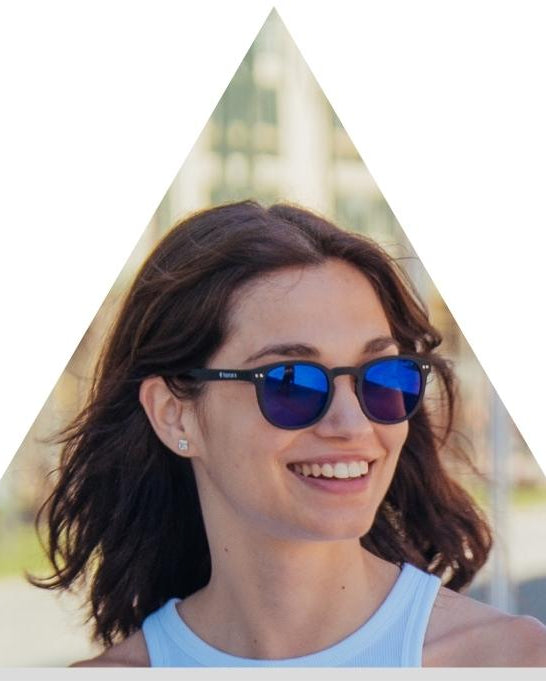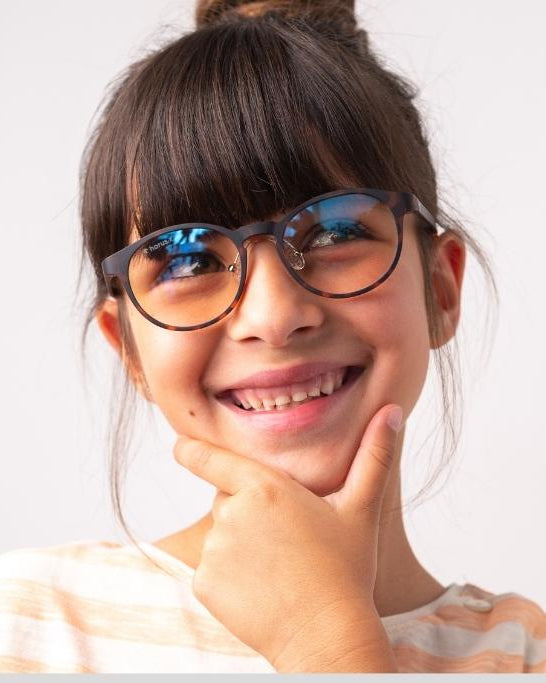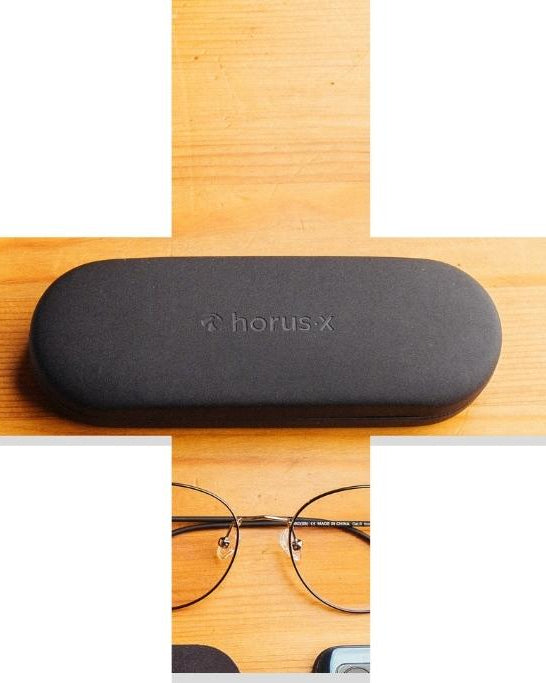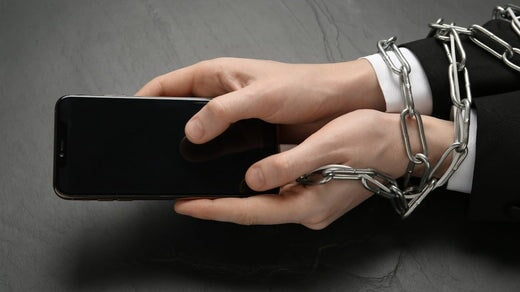Today we’re here to tell you a secret... blue light blocking glasses have their downside. Glasses that block blue light aren’t going to magically solve all your problems and they won’t make you immortal (sorry). The truth is that while they’re super effective for some things, they also have their drawbacks.
Let’s look at the potentially negative effects of wearing blue light blocking glasses.
The origin of the problem
Without going too deep into technical talk, blue light filter glasses are equipped with lenses that block blue light (duh!). They shield your eye from the potentially harmful effects of blue light, only allowing a limited amount through.
But how does that actually help?
Why block blue light?
Blue light has been identified as one of the biggest factors contributing to digital eye strain, and there have been studies from health professionals that have highlighted the negative impact on the long-term health of your eyes.

The problem is that a lot of people, upon hearing this, rushed to new solutions without thinking about the root cause of the issue. This led to a lot of people rushing to inferior products on the market and all of a sudden blue light computer glasses became more detrimental than anything else.
The cons of blue light glasses
Natural Blue light is needed
Like The Good Place and The Bad Place, there’s good and bad blue light. It’s therefore super important to know which type your lenses are filtering.
Brands that claim to filter 100% of blue light without specifying at what wavelengths are not recommended.
That’s because the most harmful blue light is found at the border with ultraviolet rays between 380 and 430, up to 450 nanometers. So blue light glasses filtering at other wavelengths aren’t actually doing anything to prevent harm to your eyes.
The light on this part of the spectrum is particularly powerful and can cause long term damage to your retina. This means it should be blocked as much as possible.

Blue light above this harmful wavelength spectrum is, however, actually beneficial. Not only that, it’s essential to our sleep cycle and rhythm. This blue light regulates the production of melatonin, the famous sleep hormone, and allows you to fall asleep and wake up according to your circadian rhythm.
That being said, over exposure, particularly at night, to this blue light can also prevent you from falling asleep.
It’s therefore recommended that in the evenings you block as much artificial blue light as possible (such as that coming from your TV, mobile, or computer screen) so you can fall asleep more naturally.
Glasses don’t provide 100% protection against digital eye strain and fatigue
No glasses can protect you 100% from the dangers of staring at a digital screen for too long. They may block the harmful spectrum but the digital fatigue of using devices with screens can’t be completely counteracted, no matter how much you tell yourself so as you click “continue watching” on Netflix.
Above all, it’s important to find a balance and use screens in moderation - which we know is easier said than done when almost all aspects of your life revolve around differently sized shapes and screens.
But as per our article on digital eye strain, there are some ways to lessen the effects on your eyes. Here’s a quick recap:
- ⏱️ Use the 20/20/20 technique (every 20 minutes, look 20 feet away for 20 seconds).
- 😜 Blink more often
- 🚰 Stay hydrated
- 💡 Reduce glare and ambient light
- 💻 Optimize your screen display
Glasses alone are undeniably a great help, but pair with these suggestions and you’ll have laser vision in no time. It will also help counteract long term effects of spending hours a day working hard at a computer, or more accurately, binge watching the last season of Stranger Things.
Ineffective or unsuitable blue light blocking glasses
Sometimes you really do get what you pay for. So, if those sunnies that cost $5 from The Beach Hut claim to block blue light, you might not want to believe them. Or at least, they probably don’t block the right blue light.
This could actually be dangerous, as when you believe you’re protected you might act a bit more recklessly and intensify your screen use... if that’s possible.
A word of advice: All US sunglasses must fit FDA safety standards, however, if you’re fancy enough to import some from Europe (or go there on holiday) a good way to check they’re safe is to ensure they have the CE logo on the frames. You can even ask for test reports to your favorite manufacturer to see if they walk the walk.
Staying stylish
Finally, not only do you want to be healthy, you want to look good. Unfortunately, a lot of blue light glasses don’t really fit the bill and can make you look at bit like a low rent Bono. They can also have a pretty unattractive tint on the lenses, from a distinctly unpleasant looking yellow, to an even less pleasant shade of brown.
That’s because their primary function is to be worn while staring at screens and manufacturers have based their designs on safety and functionality over aesthetics.
But why are blue light glasses bad - can’t you have the best of both?
It’s just as beneficial to wear anti-blue light sunglasses in everyday life and you don’t want to be disowned by friends and family for doing so.
Some companies (cough...Horus X...cough) think about both. We like a light transparent shade on our lenses like our Casual glasses equipped with our Ghost technology, or an electric orange like our Gaming Revolution pair with our Plasma technology for the more out-there fashionista (or check the complete gaming glasses collection for other models).
Are blue light blocking glasses actually effective?
Here’s the truth: despite a few drawbacks blue light blocking glasses are super effective and worth investing in. That is, providing the lens:
- Filters the harmful part of blue light (between 380 and 450 nanometers)
- Filters all UV rays (A,B,C)
- Reduces bad reflections
For some the effect is immediate, for others it will take a few days but the relief of eyestrain, eye fatigue, blurred vision, and other short-term benefits is almost always there.
Putting aside short-term benefits, blue light glasses durably protect your retina from the potentially harmful effects of blue light exposure (Macular degeneration, recurring migraines...)
Ideally though, you don’t want to use them all the time, but if you’re someone who spends 6+ hours a day staring at a screen, working, or playing games, they are definitely beneficial to pop on.
How do I know if I need blue light blocking glasses?
Do you use a screen? Yes? Then you need them. It really is as simple as that.
Also in this day and age, even if you’re the ultimate hipster with no TV, phone, computer or light bulbs you’re still going to encounter some blue light (LED lighting anyone?).
Whether you use them to protect your eyes during a long work day, or to guard your melatonin levels before sleep, blue light blocking glasses are very effective. Providing of course, you choose the right type.
We therefore recommend you keep a pair nearby. And if you have children then get them a pair too! Their retinas are even more sensitive to high-energy light, so limit their screen exposure wherever possible and also ensure they’re equipped with a cute pair of glasses for optimum protection and cuteness when they are watching sponge bob.
Our recommendation for the best blue light glasses
Anti-blue light and gaming glasses vary in price, but we would like to think that Horus X are the best. For minimum color distortion but maximum protection, check out our Stockholm lenses. Its peak fashion without peak pricing at $34.90.

Or, if you want the best of the best and can afford to splash the cash just a little, our attractive, clear-lensed Ushuaia and Roma glasses are $54.90 a piece.

Finally, if you want that extra level of protection for your digital all-nighters (as nobody calls them), you could choose the Gaming Revolution with the highest level of protection.

Why are blue light glasses bad? Final thoughts
Simply put, they’re not. As long as they’re chosen carefully and worn correctly.
While blue blocking glasses are far from the ultimate solution to all of your problems, picking your pair well and wearing them at the right time will unquestionably preserve your comfort and eye health in the long term.
Also, try to balance your days a bit better by reducing your screen time a tiny bit. Think of exercising more as it will increase your focus, productivity and long terme health.
Any questions? Let us know in the comments below!
Other frequently asked questions :
Are blue light glasses damaging?
They can be if not chosen carefully. Make sure they protect you from UV light, blue light on the 380-450 nm range and have anti reflective properties. Also make sure that they are FDA compliant.
Is it ok to wear blue light glasses all day?
It is ok but not necessary. Except if you are particularly photosensitive, you do not need constant blue light protection. Natural blue light is good for you too.
Do blue light glasses make you tired?
They should not. Over use of your screen can make you tired. Your glasses could be badly designed or not suited to your specific morphology if that is the case.
Why do my eyes hurt when I wear blue light glasses?
While it is impossible to completely get rid of eye strain while staring at a screen, your glasses should not make it worse. If you are hurting more with glasses, it means you need to change for a better pair. Heard of Horus X, the best glasses in the galaxy ?
Can blue light glasses cause headaches, make you dizzy or nauseous?
Yes ! If you are the unlucky owner of a pair of cheaply made glasses it is possible. In that case you should stop wearing them and find a better pair (maybe they are too narrow and disturb your vision, maybe the filter is not very good... whatever the reason don't settle for less).















